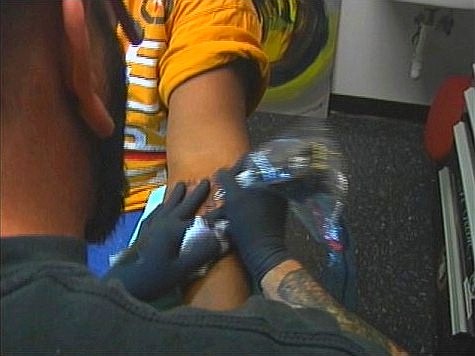NASHVILLE -- The sponsor of legislation that seeks to strengthen a Tennessee law prohibiting the tattooing of minors says the measure also would help fight gang activity, even though critics lament the proposal could be burdensome.
Currently, a person under 18 cannot get a tattoo. A 16-year-old can be tattooed to cover up an existing tattoo, but only with the consent of a parent or guardian, who must be present during the procedure.
Rep. Antonio Parkinson's proposal would mirror the state's child abuse law, which requires signs of abuse to be reported to law enforcement or an entity such as the health department. Those making the report might be a physician, a police officer or someone in education, such as a teacher.
"Just like if a teacher sees a minor with a bruise on their back, minors with tattoos would be reported the same," Parkinson said of his bill.
The Memphis Democrat said he proposed the legislation after hearing about places where minors were being tattooed illegally, and possibly risked being exposed to equipment not properly sanitized.
He said one woman told him her teenage daughter got a tattoo at such a place. The mark ended up costing the girl her job at a fast food restaurant that didn't allow its employees to have tattoos.
Parkinson said he believes the proposal also would benefit law enforcement because many of the illegal parlors give tattoos to teenage gang members.
"A lot of tattoo artists don't do gang tattoos in legitimate tattoo houses," he said. "If a minor is found to have these tattoos, this is a way for us to find out where they came from and actually penetrate the criminal enterprise the gang members are utilizing."
Kristin Helm is the spokeswoman for the Tennessee Bureau of Investigation, which is among law enforcement battling gang activity that's becoming more prevalent in parts of the state.
She said the agency can't comment on the usefulness of the bill because it doesn't know how "procedurally it would work and how TBI would be, or not be, affected."
At least 39 states have laws prohibiting minors from getting tattoos, according to the National Conference of State Legislatures. Thirty-one states have laws that prohibit both body piercing and tattooing on minors without parental permission.
As for the reporting component of Parkinson's legislation, critics feel it would be burdensome, especially for teachers who they say already have enough responsibility handling their students.
"We don't need to turn teachers into policemen," said Tennessee Education Association lobbyist Jerry Winters. "They have enough on their plate already."
State Rep. John Deberry said the responsibility of checking teenagers for tattoos, or gang signs, should lie with their parents.
"Who let them out of the house with that?" said the Memphis Democrat. "At some point we've got to put attention back on the parents, and parental responsibilities, and just keep it there."
Regardless who notices the tattoos, Parkinson, a firefighter and retired Marine, said he also wants to send a message that minors should think twice about getting a tattoo -- which can leave a permanent mark even if it's covered up.
"We've heard about minors as young as 9 having tattoos on their bodies," Parkinson said. "At that age, they're not necessarily thinking about their future as it pertains to them entering into the workforce. Some employers will look at the tattoos and view them as not being appropriate. That in turn will cause these minors to be judged before they're even allowed to show who they really are, or their capacity of thinking."
Dan Haskell, general counsel for the Tennessee Hospitality Association, said restaurant and hotel owners have a right to say whether their employees can have tattoos or piercings.
"It's just not at all unusual to have policies about piercing and tattoos," he said. "And certainly how you dress is an issue in many places."
James W. Lewis is president of the National Society of High School Scholars. He said he understands the pushback some companies may have about tattoos or piercings, but he said those individuals who are turned away because of their appearance may actually be very talented and could be an asset.
"It may be exactly the person they need to hire," Lewis said. "We can't really judge an individual by the color of their skin or what they may have applied to their skin. We have to ... look at the qualities of this next generation, because they are our leaders."

